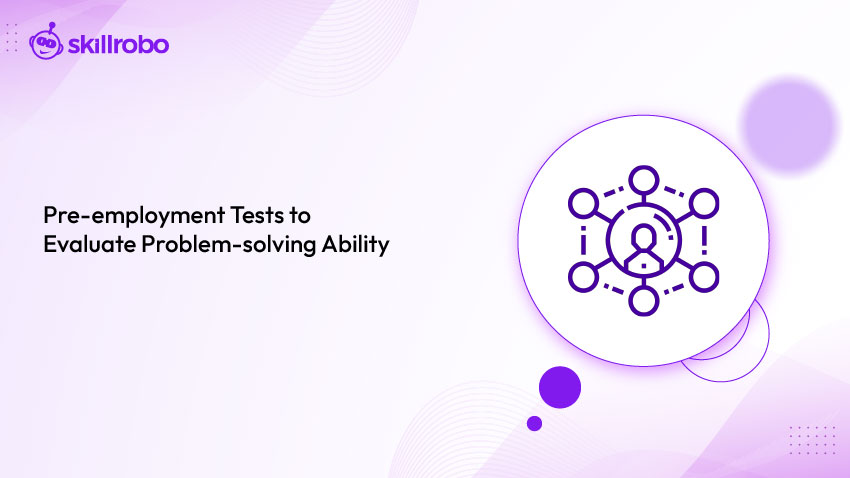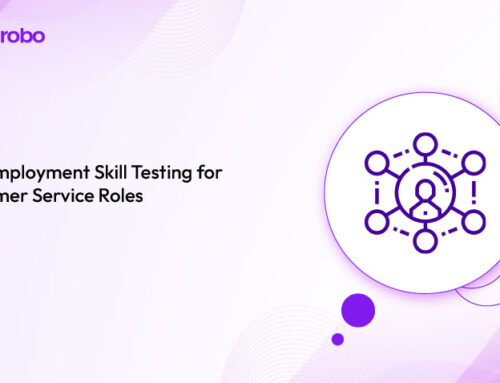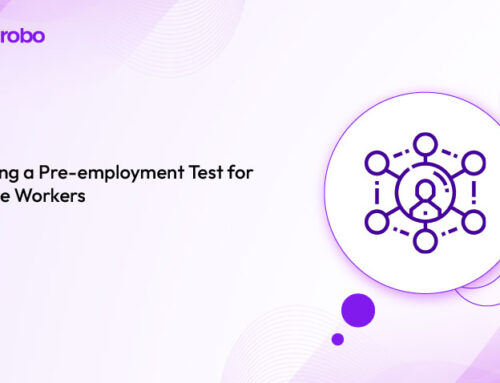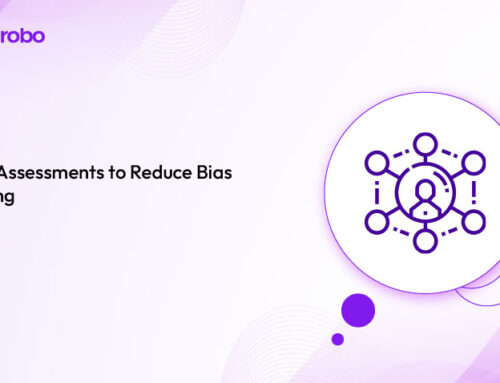
Key Takeaways
- Problem-solving tests assess critical thinking, logic, and adaptability—skills essential for handling real workplace challenges.
- Combining cognitive, technical, behavioral, and psychometric tests offers a complete view of a candidate’s abilities.
- Structured assessments reduce hiring bias by focusing on measurable performance instead of background or intuition.
- Effective implementation improves hiring speed, team performance, and candidate experience, while minimizing mis-hires and boosting fairness.
Why Problem-Solving Tests Are Essential for Hiring
Picture a new hire facing a workplace challenge: a client’s upset, a deadline’s tight, and the system’s acting up. Will they step up with a solution or freeze? Pre-employment problem-solving tests give you a clear view of how candidates handle these moments, showing who can think critically and act decisively when it counts.
These tests assess core skills like critical thinking, logical reasoning, creativity, and resilience, which are vital for roles across industries, from IT to HR. They go beyond resumes, revealing who can tackle real-world problems, not just sound good in an interview.
With platforms like Skillrobo, you can customize tests to match specific job demands, ensuring relevance for any position. They also help keep hiring fair by focusing on measurable skills, reducing biases that often sneak into traditional interviews. Hiring someone who can’t handle pressure is like buying a shiny gadget with no battery—it looks good, but it won’t get the job done.
Types of Problem-Solving Tests to Consider
Problem-solving assessments come in various forms to suit different roles and industries. Using customizable platforms, you can design tests that align with your needs. Here are the key test types to evaluate problem-solving capabilities:
1. Cognitive Ability Tests
Cognitive tests measure logical reasoning, pattern recognition, verbal comprehension, and numerical aptitude. They’re ideal for roles requiring analytical thinking, such as data analysts or managers. Questions might involve solving numerical sequences or interpreting complex texts.
These tests are highly predictive of job performance across industries, from tech to retail, due to their focus on mental agility. However, they should be balanced to avoid excessive complexity that could discourage qualified candidates.
2. Technical Skill Tests
For roles like IT, engineering, or finance, technical skill tests evaluate job-specific problem-solving abilities. These might include tasks like troubleshooting software errors or analyzing financial data. With access to a library of over 50 skills, platforms can generate tests with 60-70 targeted questions to assess expertise, covering technical and cognitive skills.
Technical tests verify practical skills claimed on resumes, ensuring candidates can apply knowledge to real-world scenarios. To remain relevant, tests must align with the role’s responsibilities—don’t ask a marketer to troubleshoot software unless it’s part of their job. For guidance, see this pre-employment testing guide.
3. Behavioral Assessments
Behavioral tests focus on traits that influence problem-solving, such as adaptability, creativity, and composure under pressure. Through questionnaires or scenario-based questions, they reveal how candidates approach challenges and whether they view obstacles as opportunities. Explore their impact with this behavioral assessment guide.
These tests are critical for assessing long-term fit, as technical skills alone don’t guarantee resilience or teamwork. They identify candidates who can thrive in dynamic environments and contribute to organizational growth.
4. Psychometric Tests
Psychometric tests measure personality traits and cognitive styles linked to problem-solving, such as curiosity or openness to innovation. They’re particularly useful for roles requiring creativity, like marketing or product development. Dive into their potential with this psychometric assessment test.
Psychometric tests require context to interpret results effectively. Traits like risk-taking may benefit certain roles but be less suitable for others, so they should complement other assessments for a balanced evaluation.
How to Implement Problem-Solving Tests Effectively
Implementing problem-solving tests well can elevate your hiring process. Thoughtful design ensures they identify top talent efficiently. Problem-solving tests can transform hiring when implemented thoughtfully. A strategic approach ensures they’re relevant, fair, and effective for HR teams.
Here’s how to set them up for success:
1. Align Tests with Job Requirements
Tests should reflect the role’s specific challenges. For example, a financial analyst’s test might focus on data interpretation, while a customer service role could emphasize conflict resolution. SkillRobo’s AI-powered SEYARC bot can generate tailored questions to keep tests relevant, avoiding the mismatch of asking a sales rep to analyze complex datasets.
2. Combine Test Types
A single test type won’t capture the full picture. Blend cognitive tests for mental sharpness, technical tests for job-specific skills, and behavioral or psychometric tests for personality traits. This mix gives you a well-rounded view of a candidate’s problem-solving abilities.
3. Ensure Fairness
Hiring bias can derail recruitment efforts. Standardized tests reduce subjectivity by focusing on measurable skills. Secure features, like webcam monitoring and tab-switching detection, prevent cheating and maintain integrity. For more on keeping the process equitable, see this using assessments to reduce bias in hiring.
4. Focus on Candidate Experience
A poorly designed test can frustrate candidates, skewing results. Clear instructions, intuitive interfaces, and accessibility options—such as screen reader compatibility or adjustable text sizes—create a positive experience, letting candidates perform at their best. A smooth platform keeps stress low, so talent can shine.
5. Use Data Insights
Analytics are where the real value lies. Look for platforms that provide instant, detailed reports breaking down performance by section. These insights help you identify top candidates quickly and integrate with HR systems for efficient hiring decisions.
Benefits of Effective Problem-Solving Assessments
Well-executed problem-solving assessments are a game-changer for HR teams, streamlining recruitment and ensuring you hire candidates who can thrive. These tests offer a range of advantages that make hiring more efficient, equitable, and impactful. Here’s why they’re essential for building strong teams:
1. Hire Candidates Who Excel: Problem-solving tests identify individuals who can tackle workplace challenges, from resolving technical issues to managing client concerns. By assessing skills like critical thinking and resilience, you ensure hires are equipped to perform, reducing the risk of costly mis-hires. Detailed analytics provide insights into candidate performance, helping you select those ready to contribute.
2. Save Time and Streamline Hiring: Reviewing stacks of resumes can feel endless, but problem-solving tests cut through the noise. Instant, section-wise performance reports let you shortlist top candidates quickly and efficiently. Integration with HR systems further simplifies the process, allowing you to focus on strategic priorities.
3. Enhance Team Performance: Candidates who excel in problem-solving tests bring efficiency and adaptability to your team. They handle challenges proactively, reducing workplace bottlenecks and boosting productivity. By testing technical and behavioral traits, you build a cohesive team that works well together, minimizing disruptions.
4. Promote Fairness and Diversity: Bias in hiring can undermine efforts to build inclusive teams. Standardized tests focus on measurable skills, ensuring candidates are evaluated based on ability, not subjective factors. Secure testing environments maintain integrity, supporting diverse hires. Learn more about using assessments to reduce bias in hiring.
5. Scale for Any Recruitment Need: Whether hiring one specialist or a large team, problem-solving tests adapt to your requirements. Cloud-based platforms and AI-generated questions enable custom test creation for roles at any level, from entry-level to executive, making high-volume or niche hiring manageable.
6. Strengthen Your Employer Brand: Using fair, data-driven assessments shows candidates you value talent and equity. This builds a reputation as a forward-thinking employer, attracting top professionals. Custom branding, like adding your logo to tests, adds a professional touch that enhances candidate experience.
7. Accelerate Onboarding: Candidates who perform well in problem-solving tests often adapt quickly, thanks to their critical thinking and learning abilities. Tests covering job-specific competencies ensure hires require less training and deliver results sooner, saving time and resources.
8. Enable Data-Driven Hiring: Relying on intuition can lead to hiring missteps. Problem-solving tests provide clear, actionable data through detailed analytics, empowering informed decisions. Performance reports highlight strengths and gaps, so you can choose candidates with confidence.
How SkillRobo Solves Problem-Solving Assessment Challenges
SkillRobo makes creating and managing problem-solving assessments straightforward, addressing key hiring challenges for HR teams. Its library of over 50 skills supports tailored tests for roles like IT, finance, or customer service, ensuring evaluations match job demands.
The AI-powered SEYARC bot generates custom questions quickly, saving time when standard tests don’t fit. Secure features, including webcam monitoring and tab-switching detection, maintain fairness by preventing cheating. Instant analytics provide detailed performance breakdowns, enabling data-driven decisions to identify top problem-solvers.
With accessibility options like screen reader support and seamless HR system integration, SkillRobo delivers an efficient, equitable, and user-friendly solution for hiring talent that excels under pressure.
Common Mistakes to Avoid
To ensure tests deliver results, steer clear of these pitfalls:
- Overly Complex Tests: Tests that are too difficult can alienate strong candidates. Keep them challenging but accessible.
- Neglecting Soft Skills: Problem-solving involves emotional and interpersonal skills, too. Include behavioral assessments to capture these traits.
- Skipping Candidate Feedback: Providing brief performance insights builds trust, even for those not selected.
- Over-Reliance on Tests: Tests are powerful, but should be paired with interviews and reference checks for a complete evaluation.
Conclusion
Hiring problem-solvers is like picking the right teammate for a critical project—you need someone who can deliver under pressure. Pre-employment tests help you find candidates who think fast, stay calm, and turn challenges into opportunities. From cognitive assessments to behavioral insights, they provide the data to hire smarter and fairer. With resources like the linked guides, you’re equipped to build a team that excels. Move past outdated hiring methods, embrace these tests, and watch your hires drive success.
Ready for game-changers? Sign up today to shape your ideal virtual team.









